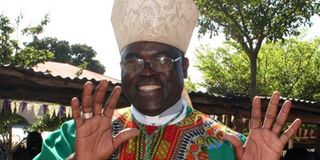Row over bishop threatens to split diocese

The Bishop of Arua Diocese, the Rev Sabino Ocan Odoki, at a function. PHOTO BY FELIX WAROM OKELLO
What you need to know:
A section of clergy in Arua Diocese rejected Bishop Odoki over mismanagement. While the Church’s top leadership has called for reconciliation, the flock has been pitted against different camps.
Arua
When the Rev Sabino Ocan Odoki was consecrated as the Bishop of Arua Diocese in October 2010, priests and laity were willing to work with the new shepherd in love, unity and peace. But their pledge was short lived because three years later, the clerics under the Arua Diocesan Priests Union presented an August 21 letter to Bishop Odoki rejecting him for alleged impersonation, mismanagement and stirring tribal sentiments, claims the latter denies. The conflict, which is slowly dividing the diocese, has prompted the intervention of the top Catholic church leadership.
Last week, a team of bishops arrived in Arua Diocese led by Apostolic Nuncio to Uganda Micheal Blume, chairman of Uganda Episcopal Conference Archbishop John Baptist Odama and His Eminence Cardinal Emmanuel Wamala, among others to intervene in the impasse.
One of the laity, who attended the meeting with the clerics, but preferred anonymity due to gravity of the matter, said: “The bishops were not happy about what was going on, but promised to settle the matter.” The genesis of the dispute stems from the dismissal of Fr Valentino Matua last July. According to Bishop Odoki in a letter addressed to Fr Mutua, he accused the latter of being an imposter.
Dismissal
“From the time I took office in Arua Diocese, I found no documents confirming your formation for priesthood. I have not even found any documents of your installation to the offices of Lector and Acolyte. Neither have I found any certificates of your ordinations … nor any letter of your incardination to Arua Diocese… but an impostor,” the letter reads in part.
“I have from now on no responsibility over you until I get credible documents to prove your formation for priesthood and subsequent ordination. Only then shall I discuss with you,” the letter adds. Before the priest could vacate, the bishop asked for policemen to evict him.
However, in response, Fr Matua stated: “I was ordained priest on August 31, 1980… It is absurd to hear you raise doubts about my priestly formation and ordination. In October 2011, you appointed me Chaplain of Mandela Comprehensive Secondary School and Arua Prisons without verifying if I am a priest or not. Were you appointing an imposter then?”
The acrimony reportedly developed when Fr Matua refused to give two per cent of the Land Conflict Management Programme to Bishop Odoki to cover diocesan administrative costs. According to his critics, the bishop maliciously transferred priests in the diocese over rampant corruption that was undermining donor confidence. Other priests such as Fr Modesto Odama and Fr Natalino Vurra have resigned.
The critics also say Church attendance and income have reduced. Speaking to the Daily Monitor on Monday, Bishop Odoki appealed to the concerned clergy to sort out the matter with him. “Those are not issues at all. They should come to me to discuss them because I am waiting for them. These are issues of management and administration, yet they fear meeting me,” Bishop Odoki said.
The coordinator of the Lay Apostolate, Ms Martha Tiperu, said some priests and laity, who allegedly abused and insulted the bishop, were causing divisions. She said the bishop had spearheaded development in the diocese by promoting self-reliance, creating several zones, sub-parishes and parishes, settling Shs100 million arrears of major seminarians, among others.
In the September 11 meeting, Archbishop Odama said the conflict was an affair within the catholic family, adding that it had made the church a laughing stock. He advised his colleagues to repent and repair the image of the diocese. It waits to be seen if the message will be taken.
How a bishop is elected
In the Catholic Church, bishops and archbishops are appointed by the Pope. When a diocese falls vacant, the process for appointing a new bishop begins. The Apostolic Nuncio (the Vatican ambassador) inquires for names, seeking opinions from bishops and priests of the diocese, and anyone else he thinks appropriate. He compiles a ‘ternus’ - list of three names - of candidates and presents it, with his own opinions, to the Holy See.
The Pope may accept one of the candidates or consult further. The whole process is confidential.
Church law (Canon 378) states that a suitable candidate must be: “Outstanding in strong faith, good morals, piety, zeal, wisdom, prudence and human virtues, and possess those other gifts which equip him to fulfill the office of the bishop”; “Held in good esteem”
The candidate should be at least 35 years of age; A priest ordained for at least five years; Hold a doctorate or a licentiate or at least be well versed sacred scripture, theology, or canon law.
If the candidate chosen accepts his appointment, it is announced, and he must take office within three months. It is recommended that there be a public church service or mass when he takes office.




